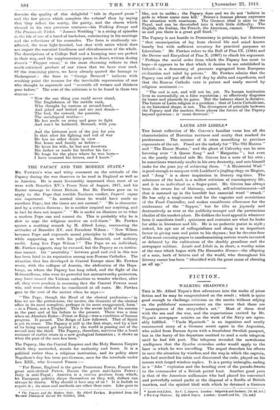THE PAPACY AND THE MODERN STATE.*
Mn. FAWKES'S wise and witty comment on the attitude of the Papacy during the war deserves to be read in England as well as in America. He is more favourably impressed than most of us were with Benedict XV.'s Peace Note of August, 1917, and his Easter message to Great Britain. But Mr. Fawkes goes on to apply to the Pope that terrible Tacitean verdict, Imperii capax nisi itnperasset. "In normal times he would have made an excellent Pope ; but the times are not normal." "He is oharacter- ized by a certain flatness ; he is neither inspired nor inspiring, and in fact he does not inspire." "He is under no illusions as to what a modern Pope can and cannot do. This is probably why he is slow to urge the religious motive on evil-doers." Mr. Fawkes quotes a scathing remark by M. Alfred Loisy, contrasting the attitudes of Benedict XV. and President Wilson : "Now Wilson 'becomes Pope and expounds moral principles to the belligerents, while supporting us with his political, financial, and military credit. Long live Pope Wilson ! " The Pope as an individual, Mr. Fawkes suggests, may be excused, but the Papacy as an institu- tion cannot. Its " neutrality " between good and evil in this war has been fatal to its reputation among non-Roman Catholics. The situation that has developed in Central Europe since Mr. Fawkes wrote, with the collapse of Austria, the abdication of the Haps- burgs, on whom the Papacy has long relied, and the flight of the Hohenzollerns, who were its powerful but untrustworthy protectors, may have caused the Vatican authorities to wonder whether, after all, they were prudent in assuming that the Central Powers must win, and must therefore be conciliated at all costs. Mr. Fawkes goes to the root of the matter when he says :— " The Pope, though the Head of the clerical profession—' in him we see the pretensions, the merits, the demerits of the clerical office in its most complete, perhaps in its most exaggerated, form' —is a Priest, not a Prophet. This is the secret both of his success in the past and of his failure in the present. There was a time when an Absolute Ruler—Priest or King—was a condition of human progress. It passed. The Reign of Law followed. That of Spirit is yet to come. The Papacy is still in the first stage, and by a law of its being cannot get beyond it ; the world is passing out of the second into the third. The Papacy, therefore, survives like a fossil remnant of earlier strata in a new geological formation ; it shows us what the past of the race has been."
The Papacy, like the Central Empires and the Holy Roman Empire which they succeeded, stands for authority and force. It is a political rather than a religious institution, and its policy since Napoleon's day has been pro-German, save for the interlude under Leo XIII., who favoured France :—
"For Rome, England is the great Protestant Power, France the great anti-clerical Power, Russia the great anti-Latin Power ; Italy is anti-Papal ; America is a eentina gentium from which, let European politics shape themselves as they will, dollars can always be drawn. Why should it love any of us ? It is foolish to expect it ; its aims and methods are other than ours. Like goes to • The Papacy and the Modern State. By Alfred Fawkes. Reprinted hem the Romani Theological Review for October, 1918.
like, not to unlike ; the Papacy does and we do not 'believe in gods in whose name men kill. Brieux's famous phrase expresses the situation with exactness. The Getman ideal is akin to the Papal, and can be dovetailed into it with little difficulty. The English, the Italian, the French, the American, cannot. 'Between us and you there is a great gulf fixed.'"
The Papacy is not hostile to Democracy in principle, but it detests "that emancipation of lay from clerical life and mind known loosely but with sufficient accuracy for practical purposes as Liberalism." Mr. Fawkes refers to the Bull of Pius IX. (1864) and the Decree and Encyclical of Pius X. (1907) to clinch his argument. "Perhaps the social order from which the Papacy has most to hope—it appears to be that which it desires to see established in Ireland—is a democracy of peasants segregated from European civilization and ruled by priests." Mr. Fawkes admits that the Papacy can still put off the evil day by shifts and expedients, and that the Roman Catholic vote is potent and easily moved by religious sentiment :— " The end is not, and will not be, yet. No human institution lives so successfully on a false reputation ; so effectively disguises its losses and placards its gains. But the balance sheet is decisive. The future of Latin religion is a problem ; that of Latin Catholicism, in its historical shape, is not. The divergence of principle between the Papacy and the modern State places the future of the Papacy beyond question : it 'must decrease.'"


































 Previous page
Previous page